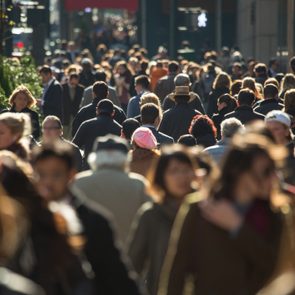The Real Reasons People Fall for Conspiracy Theories

Some people believe vaccines install tracking devices in humans. We quiz psychology professor Ghayda Hassan to find out why people get sucked in by conspiracies.
Reader’s Digest Canada: Not that long ago, conspiracies were for wing nuts in tinfoil hats. Now they’re everywhere. What happened?
Ghayda Hassan: We’ve definitely seen them gain a lot of momentum in the last few years—the last year, in particular, with COVID-19 and the divisive political climate in the United States. Conspiratorial thinking becomes more popular during times of strife and instability. People are scared and they’re looking for explanations.
What’s the distinction between a conspiracy theory and healthy skepticism?
Broadly speaking, a conspiracy theory is a belief that explains an event or a set of circumstances as the result of a secret plot, usually by a powerful organization. In the case of QAnon, it’s the belief that there’s a secret cabal of Satanist pedophiles running a global child sex-trafficking ring and plotting against Donald Trump.
It’s healthy to question authority, but with conspiratorial thinking you get people ignoring evidence and misinterpreting facts. For instance, Pizzagate—a precursor to QAnon—is the belief that Hillary Clinton’s emails contained codes about a secret child sex ring run out of a pizza restaurant in Washington. It’s true that Clinton did have emails that were under investigation, but that is not evidence of a child sex ring.
It all sounds so preposterous. How do people get sucked in?
Most people don’t wake up one day believing that, for example, the moon landing was staged in a television studio. Instead, it’s more of a grooming process. A person feels dissatisfied or alienated and maybe they watch a video on social media about the landing being a hoax. Certain ideas are normalized, and it’s a slippery slope from there.
A lot of the big conspiracy theories come from the U.S. Are there any that are homegrown?
The Proud Boys, a hate group that made headlines after the storming of the Capitol and uses conspiratorial thinking to push its agenda, was founded by an expat Canadian. But with Canada being a much smaller country, we tend to follow a lot of what we see in the U.S. For example, the armed man who stormed the gates of Rideau Hall was a QAnon supporter.
Are popular conspiracy theories always political?
They often are, but not always. For instance, there’s one that the underwire in bras causes cancer and another that Bill Gates wants to use vaccines to install tracking devices in humans.
Are there characteristics that make a person more likely to fall for them?
There are, but they’re not necessarily what you would think. People have this idea that it’s more common among less educated people, but that’s not really the case. We know that access to broad sources of information is beneficial, which may relate to a person’s level of education, but far more often we see a connection to life events: a job loss, the end of a relationship, a death. These may lead to isolation, and when a person is isolated they become far more susceptible—particularly if they’re spending a lot of time online.
How can you help a loved one to not get caught up in a conspiracy theory?
We want to talk about prevention rather than interruption, because once a person gets entrenched, pulling them out is a lot more complicated. It’s important to understand that you don’t have to debate the conspiracy theory. In fact, that can be counterproductive because it can make the person feel more isolated. The best way to help someone is to address the circumstances that have made that individual vulnerable—checking in on them regularly and encouraging social connections and community ties.
Ghayda Hassan is the director of the Canadian Practitioners Network for the Prevention of Radicalization and Extremist Violence.






